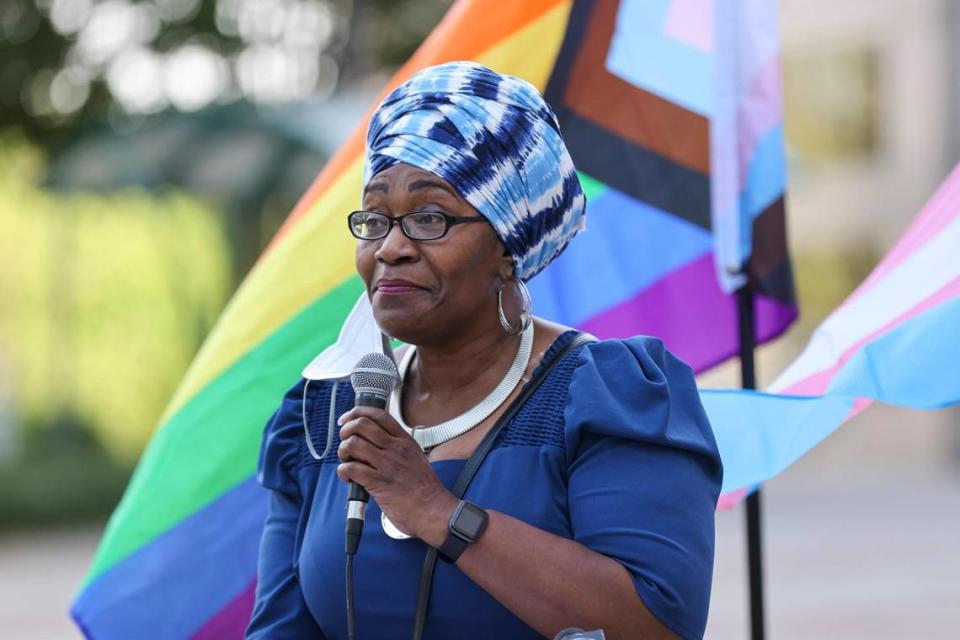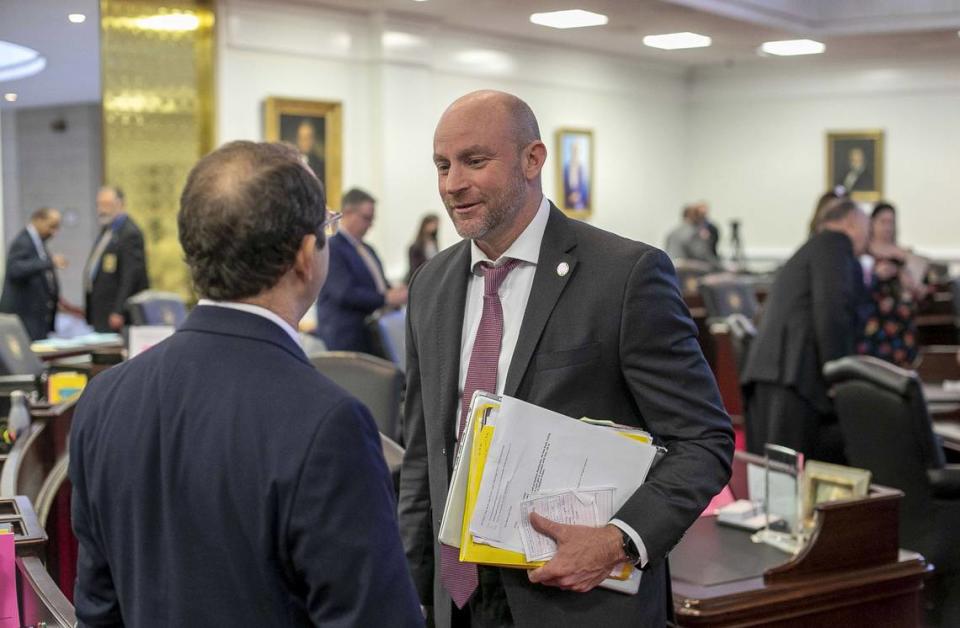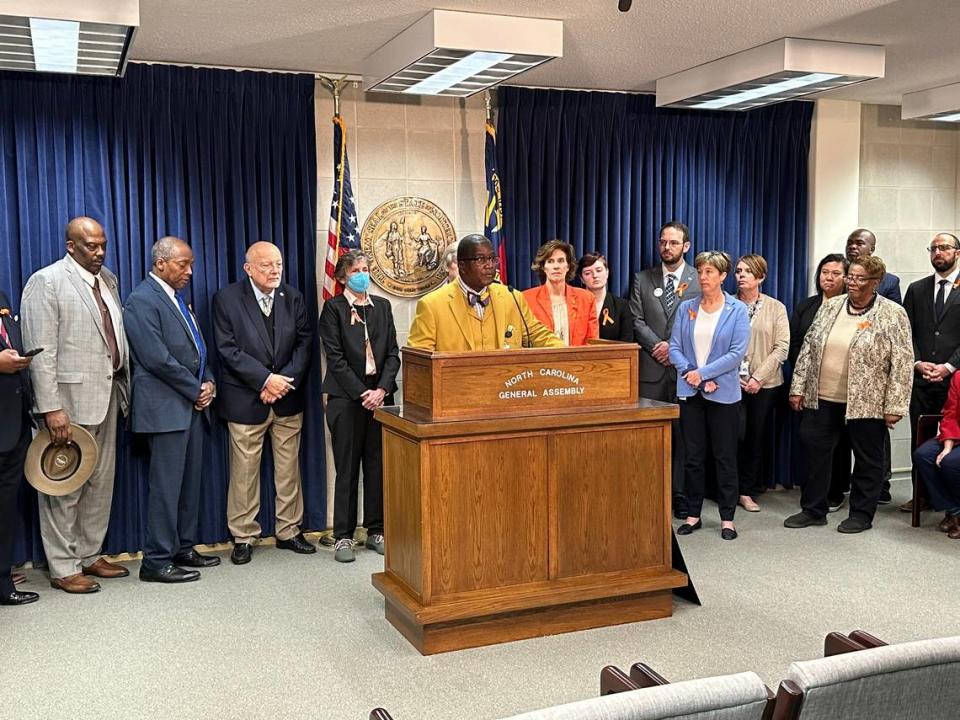NC lawmakers call gun-permit law racist. Here’s what the record shows.
Some state Republican lawmakers and gun rights advocates are pushing for an end to North Carolina’s 104-year-old law requiring permits for handguns by claiming it was racist.
In news releases and public remarks they have repeatedly called it a “Jim Crow era” law, referring to the post Reconstruction period when North Carolina and other states passed discriminatory laws against Black people.
The House and Senate quickly passed repeal legislation this session but have yet to agree on a final version.
But evidence that the gun-permit law was written to deny guns to Black people is scant, with two publications often cited as proof acknowledging that the law’s language doesn’t mention race. News reports from when the bills passed cited a need to combat gun violence in the state.
On Wednesday, Duke University’s Center for Firearms Law challenged the racist-origin claim head on.
“Broad statements that North Carolina’s permit law was purely racist or solely intended to disarm Black citizens don’t hold up to close historical scrutiny and often do a disservice to the quality of debate and discussion surrounding modern legislative proposals like the current push to repeal the law,” reads a post written by Andrew Willinger, the center’s executive director.
Willinger and others say that some county officials who enforced the pistol-permit law after it was passed could well have used it to discriminate against Black North Carolinians. During the Jim Crow era, racist state laws and everyday practices routinely did so.
That’s not a sound reason to toss out a law intended to keep guns out of the hands of people who are a threat to others and themselves, say opponents to the House and Senate bills that would repeal the permit law.

Linking efforts to reduce gun control to advancing racial justice rings disingenuous in this case, some state NAACP leaders have said. That’s especially true because gun violence disproportionately harms Black North Carolinians, said Corine Mack, president of the Charlotte-Mecklenburg County NAACP branch.
“We need to stop with the performative politics, OK? Stop with the performative activism and be really honest about what’s happening in this country,” Mack said. “Children are dying.”
Child gun deaths are surging in the state, according to the Child Fatality Task Force. Its most recent annual report said gun deaths for those 17 and under have more than tripled – from 36 in 2012 to 121 in 2021 – with much of that increase in 2020 and 2021.
READ MORE: Gun violence is a growing cause of death for children in NC, task force study finds
Across the state, guns turn up in places they shouldn’t. Twelve schools last month reported students caught bringing guns, while an additional school reported a juvenile was caught with an AR-15 assault style rifle at a Millbrook High School basketball game. Two weekends ago, a man accidentally shot himself with a gun at Crabtree Valley Mall, a place where guns are prohibited.
Last October, police say a 15-year-old armed with a shotgun and handgun killed five people in Raleigh’s Hedingham neighborhood.
Permit law’s intent debated
Current state law requires handgun buyers in this state to obtain a permit from a local sheriff and undergo a background check. The North Carolina Sheriffs Association supports the repeal, though some sheriffs have come out against it.
Supporters of repeal say the federal background checks that licensed gun dealers perform make the state permit unnecessary. Opponents say that check isn’t required in sales between individuals, and lacks access to information sheriffs would have on prospective gun buyers, including misdemeanor domestic violence convictions.
Those seeking a permit, among other things, must not be addicted to drugs, have unresolved pending criminal charges or a suspended driver’s license. The permit system has a loophole, however. A permit is good for five years, a period long enough for someone to be convicted of a felony and still be able to buy guns, a Charlotte Observer analysis found.
If repeal passes, it would join other provisions the Republican-led legislature has passed over the past decade that make it easier for people to buy guns and carry them in public. Gun thefts have risen across the state since those earlier provisions have taken effect, police say, particularly from unlocked vehicles.
READ MORE: As more people carry guns, thieves steal with ease — adding weapons to NC streets
After Gov. Roy Cooper, a Democrat, vetoed legislation to kill the law requiring state gun permits in 2021, Senate Republicans claimed in a press release: “Pistol permit created by Jim Crow Democrats to keep guns away from black people.”
In support of that claim, Senate Republicans and gun rights advocates for the past two years have pointed in news releases to a North Carolina Law Review article that found “the permit system’s intention was to keep minorities from possessing handguns.
But the 2021 article by Nicholas Gallo, then a UNC law student, acknowledges that the law appears to be “racially neutral on its face.” Gallo’s chief argument that the North Carolina pistol permit law was discriminatory is that it was passed during the Jim Crow era, generally defined as from the 1870s to the 1960s.
He contended that “when taken in context with the actions of surrounding states and the attitudes regarding minorities at the time of enactment, the permit system’s intention was to keep minorities from possessing handguns.”
North Carolina and other southern states had gun licensing laws that prohibited Black people from possessing guns while slavery was legal. An 1844 North Carolina Supreme Court decision, for example, found that while the state’s constitution included the right to bear arms, it only pertained to citizens, a status the court said no Black person, free or enslaved, had at that time.
But that prohibition was invalidated with the ratification of the 14th Amendment in 1868 requiring equal protection for all citizens.

State Sen. Danny Britt, a Lumberton Republican and the lead sponsor of the successful Senate bill that would eliminate the state permits, has been quoted in news reports claiming the law had racist roots.
Britt did not return a reporter’s phone or email requests for an interview over the past two weeks.
104-year-old law
North Carolina lawmakers passed the gun-permit law in 1919. By then New York and Oregon had similar laws on the books; Missouri, Connecticut, Michigan, Hawaii, New Jersey and Texas followed, Gallo wrote.
North Carolina’s law required those buying “any pistol, so-called pump-gun, bowie knife, dirk, dagger or metallic knucks” to first obtain a permit from the Superior Court clerk in their home county. The law required the clerk to determine that the applicant was of “good moral character” through the use of “affidavits, oral evidence, or otherwise.”
News & Observer coverage at the time noted that the law was expected to reduce the number of homicides and other violent crimes. An editorial in the Winston-Salem Journal two years earlier called for tougher penalties for those concealing weapons.
“There is no question but that the startling number of homicides in this State is due in large measure to the practice of pistol toting,” the editorial said.
The law did not require the clerk to record the race of anyone receiving a permit, but newspaper articles from the time indicate some clerks did.
The “good moral character” clause in the law is unspecific, giving clerks leeway as to who they would approve for permits. That clause remains on the books, but sheriffs now review permit applications.

This clause is what gun rights advocates and some researchers say intentionally gave license to discriminate.
Paul Valone, president of the Grass Roots North Carolina gun rights group, in an interview this week likened the law to the literacy test the state required of those seeking to vote. That law was routinely used to prevent Black people from voting. It’s still on the books, though invalidated by the Voting Rights Act of 1965.
“That’s the point of a Jim Crow law,” he said. “Constructed in such a way that it appears to be race neutral yet allowing the issuing authority or the controlling authority to deny things to minorities.”
Valone cited as evidence a 1930 article in the Durham Sun newspaper reporting few Black people were among the 450 people to win permits from the court clerk.
“Few permits were issued to Negroes, the records show, the issuance being restricted almost entirely to white persons,” the article said.
But a 1920 article from the Rockingham Post-Dispatch in Richmond County reported 11 of the 32 people approved for permits were Black.
Willinger said he would be surprised if there were no instances of discriminatory enforcement during that period, but that’s not the same as saying the law itself was racially motivated.
“It’s certainly possible, I don’t think we know enough to rule that out,” he said. “But at least from what we have from historical references it seems it’s as much as likely raised out of public safety issues.”
Richard Paschal, a Raleigh lawyer, wrote the 2021 book “Jim Crow in North Carolina, The Legislative Program from 1865 to 1920.” He did not include the gun-permit law in the book because he could find no evidence of a racist intent, he said.
“Yes, this law was enacted during an era of American history in which discriminatory Jim Crow laws of all types were being enacted by American legislatures, but I am unaware of any specific evidence of the racial roots of this statute here in North Carolina,” he said in an email Tuesday.
Gun permit denials
Some Senate Republicans and Grass Roots NC have also pointed to a more recent statistic from Gallo’s law review article. He drew from Wake County’s gun permit denial statistics to suggest the law discriminates against Black people today. Those statistics showed that from 2015 to 2020, 24% of Black peoples’ permit requests were denied, compared to 8% of whites’.
Even there, Gallo, who could not be reached for comment, wasn’t making a blanket claim.
“But while this data is certainly striking, the conclusions from it are limited,” Gallo wrote. “Without further research into the reasons for permit denials broken down by race, as well as data from all counties in North Carolina, definitive conclusions regarding racial biases present in the modern permit system are speculative.”
One problem with drawing that conclusion is Black people have a much higher percentage of criminal convictions than white people. The Pew Research Center reported, for example, that the Black imprisonment rate at the end of 2018 was more than five times the rate of whites.
“The widely popular ban on possession of firearms by felons has a distinctly racially disparate impact,” UCLA law professor Adam Winkler wrote in a 2022 essay for the Harvard Law Review.
A decades-old claim
The claim that gun restriction laws in North Carolina and other states are discriminatory began roughly 30 years ago, according to a 2020 Iowa Law Review article by William & Mary law professor Timothy Zick.
Valone and state Sen. Mike Woodard have said a racist motive was behind the passage of a state law in 1935 requiring Durham County residents to register their guns. Woodard, a Durham Democrat, sponsored legislation that killed it in 2014. When the N&O asked Valone and Woodard for evidence, none was provided.
The argument gained a higher profile during the recent court battle over New York’s strict concealed carry law passed in 1911. Several public defender offices and two groups representing Black criminal defense attorneys argued in a brief in that case that the law discriminates against Black people who need weapons for self-defense.
In June, the conservative-dominated U.S. Supreme Court court tossed New York’s law, throwing doubt on gun restriction laws across the country.
Not all Republicans agree that the North Carolina permit law has racist origins. One skeptic is former House Rep. Paul Stam, an Apex Republican who served as speaker pro-tem and Republican leader for much of his 16 years in office. He wrote an opinion piece on the law in the conservative Carolina Journal last year.
“It was more likely designed to keep the rejuvenated Ku Klux Klan from carrying weapons under their sheets again,” he concluded.

